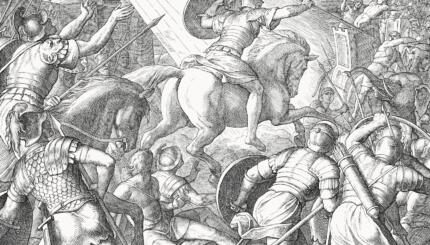The holiday of Hanukkah should be a fraught one for American Jews. Most of us know it as a gift-giving holiday, oriented towards our children, and we like to focus on its religious aspect as a holiday of religious freedom. And it is those things.
But it is also other things, darker, and bloody.
Because it is also a story of the Jewish people divided: preferring assimilation to Jewish practice, and some assimilating to an extent that they rejected circumcision and participated in idol worship. And that’s before Antiochus takes power. It is after this that Antiochus establishes his power, pillages the community, defiles the Temple, and eventually decrees that all people will now worship according to his preferences, with those who refuse subject to death.
READ: Were the Maccabees Heroes or Fanatics?
There is some debate about why Antiochus acted as he did: it doesn’t seem rational. Some historians believe that Antiochus may have been supporting a group of Hellenizers who were trying to gain the upper hand over more traditional Jews. Some think that the Hellenizers may have been trying to stave off such a repression through assimilating. Either way, they don’t come off especially well. Whether they thought that acting like Greeks would mean that they were protected, or perhaps they were sophisticated urban Hellenizers who thought those backwards traditional cousins should be forced to come around and give up their superstitious ways, they ended up subjugated by the very forces they courted.
But nor do the violent and forcible acts against their own community by the traditionalists appear good in our eyes.
The first act of rebellion by Mattathias is against another Jew who is following Antiochus’ commands (remember, on pain of death) — as Mattathias proclaims his intention to ignore these unjust commands, “a Jew came forward in the sight of all to offer a sacrifice on the altar in Modin as the royal edict required. When Mattathias saw this, he was fired with zeal; stirred to the depth of his being, he gave vent to his legitimate anger, threw himself on the man and slaughtered him on the altar.”
It is a bit uncomfortable to regard Hanukkah as a holiday of religious freedom, because while it was a rebellion against genuine oppression, it was also an act of violent communal “self-purification.”
The Jewish community today is just as fragmented as it was in those days. American Jews, in particular, have unprecedented freedom to live our lives as Jews — and while this freedom has given rise to an incredible flowering of Jewish variety, learning, and options, it has also spurred some of the same attempts at self-purification that have plagued us throughout history. Such attempts can be found in communities that shun members who are not willing to practice as they do, and if they leave, extend enormous efforts to separate them from their children; it can be found in failure to recognize one another across denominational lines; it can be found among those who paint red lines about what one may say about Israel.
None of this is to imply that setting boundaries for a community is wrong — indeed, without some recognition of lines, there can be no community. But we should be careful that our attempts to set boundaries don’t become self-defeating. There’s nothing wrong with patriotism, taking care of one’s family before turning to care for others, or setting rules. Where that becomes dangerous is when we fail to make provision for being proven wrong, or in the attempt to set rules, we allow the consolidation of power into too few hands, or make unholy alliances in the name of expediency with those whom we know to be working towards dangerous or immoral ends.
READ: Why Were the Rabbis So Uncomfortable with the Maccabees?
The sages knew well these dangers. It is not for no reason that our celebration focuses not on military victory, but on the “miracle of the oil” — a miracle which focuses our attention not on acts of war, enforced purifications, or the assumption of power, but on the effort to rebuild. Not for no reason, because the sages knew how the story of the Maccabees, the House of the Hasmoneans, ended in (if you don’t know the fascinating details, it’s worth the rather exciting read) corruption, alliance with the Romans, and eventually the loss of Jewish self-governance.



